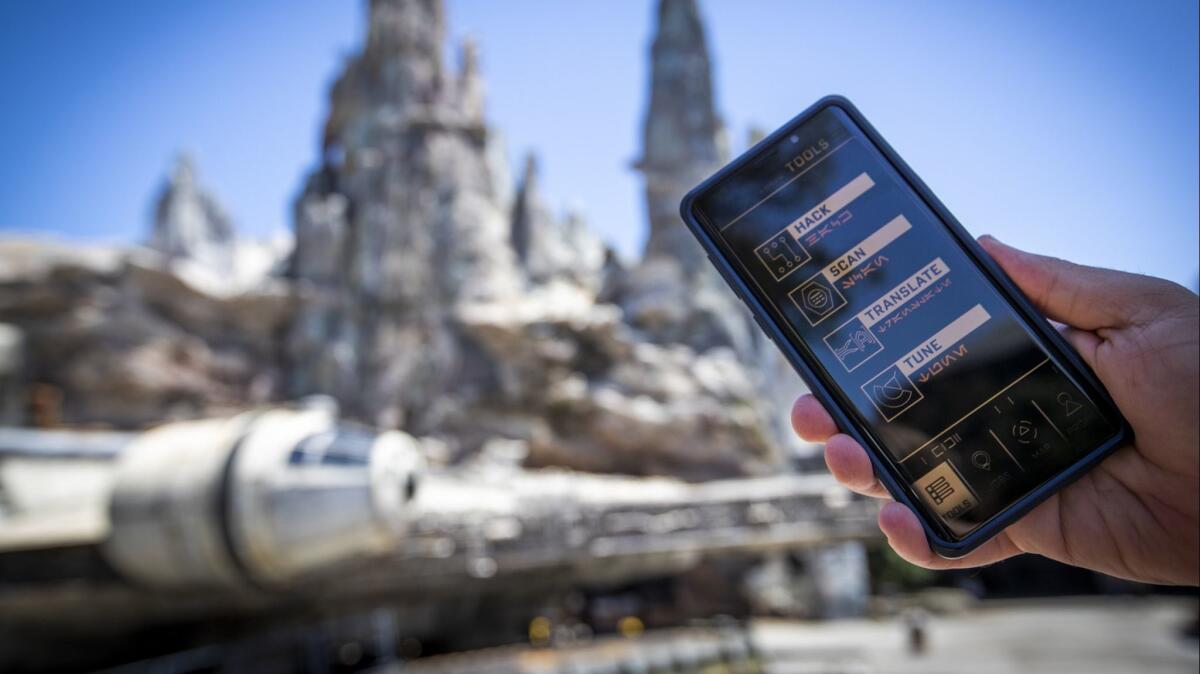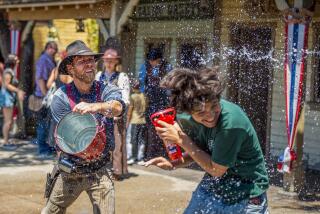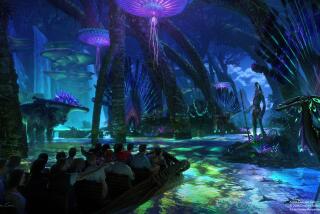Star Wars: Galaxy’s Edge becomes a live-in video game with the Disney Parks app

On a recent Friday evening there were plenty of distractions to be found in Black Spire Outpost, the fictional intergalactic city that is the heart of Disneyland’s Star Wars: Galaxy’s Edge.
Some tried to catch a glimpse of the one-eyed dianoga-creature that lives in the pipes near a drinking fountain. Others jostled for a space to watch Disneyland’s fireworks, standing just a few feet away from a charred-looking droid roasting prop meat. A pair of Stormtroopers joked with guests that they had drawn the attention of the evil First Order. And Resistance spy Vi Moradi was spotted rushing among the curved paths.
Amid this bounty of theme park activity I stood alone near the clustered shopping stalls of the Black Spire Outpost marketplace, my face buried in a phone. While an obsession with personal screens is often considered a modern societal affliction, here on Galaxy’s Edge it’s encouraged.
Nestled inside the 1-year-old Play Disney Parks mobile app is an exploration-encouraging experience called the Star Wars Datapad. Largely a home to mini-puzzles and short quests that can only be activated while inside Disneyland’s recently opened 14-acre area, the Datapad not only fleshes out the Galaxy’s Edge back story but also contains an ongoing game for control of the land itself.
With no tutorial, and the occasional crash-inducing bug, it took me about 60 minutes to get a handle on everything the app can do — it essentially becomes an attraction that uses the land as a giant game board.
Galaxy’s Edge isn’t a place built for vacationers to check things off a list. With nine shops and one open ride— a second is due later this year — it’s designed to encourage guests to participate in the action, be it role playing with in-character staff, strolling among the shops or playing the app.
Think of it as a physical space that’s trying to better understand the lessons of our increasingly play-driven and digitally focused lifestyles. Galaxy’s Edge as a whole represents an evolution in how we play in theme parks, and early indications of the still-in-development Datapad are that it too has aspirations to reshape guest involvement.
Together, they’re making the long-tail bet that the theme park visitors of today — and the near future —have a hunger for more participatory entertainment, craving interactive experiences that, if not providing full user-direction, at least create the illusion of authorship. The land’s sole open ride, Millennium Falcon: Smugglers Run, in fact requires six people to work together. No two rides may be identical.
“What the onset of the digital age has shown us is that you can make big impacts by providing a whole audience of people different pockets of experiences that they gravitate toward,” says Susan Bonds, a former creative with Walt Disney Imagineering and the CEO of 42 Entertainment, which specializes in branded augmented-reality experiences such as the company’s viral campaign for “The Dark Knight.”
“So when you think about gaming, some people are into the storytelling, and some people are into the fighting and some people are into collecting. There are so many dynamics of interest. Normally, you would think of a theme-park guest as an entity,” she continues, “but now you can think about it as all these levels, and that gives you more opportunities to provide these nuanced moments.”
Disneyland, of course, has always had game-like activities. Shooting galleries were popular in the park’s early days — the Frontierland Shootin’ Exposition has survived and still stands — and rides such as Toy Story Midway Mania or Buzz Lightyear Astro Blasters essentially place guests in a giant video game. Even the queue of Indiana Jones Adventure is essentially a game: What happens if I pull this rope? Can we decode the carving on the wall?
Galaxy’s Edge goes further in that the Datapad asks guests to become a full-on character in the world. While not as role-playing based as Ghost Town Alive at Knott’s Berry Farm or a full experiential park such as Evermore in Utah, it aims to fully realize Disneyland’s original dream — that by walling itself off from the outside world it can become not just static, movie-like sets but a place for visitors to have a starring role.
It’s storytelling via world-building and environmental exploration rather than plot-construction, and in that sense Disneyland rather closely resembles modern video games (or vice versa). Removed from Disneyland, the games of the Datapad — tuning radio waves or reconnecting virtual wires — are relatively simple, but make them location-based, and give them a time limit, and one starts to feel like an inhabitant in a cinematic world.
While one can play one puzzle and then drop it, the Datapad isn’t designed to have a beginning, middle or end; instead, it encourages participants to build a profile and start to develop a persona that can adapt over time with the land. This is done by choosing missions that align with the First Order or the Resistance.
Resistance soldier Lt. Connix, portrayed by Carrie Fisher’s daughter Billie Lourd in the current trilogy, needs your help in returning stolen ship schematics. Moradi requests your assistance in analyzing a First Order ship and Rose Tico (Kelly Marie Tran) asks you to check the stock of Resistance medical supplies. Such tasks are completed by wandering the land and finding ships, crates or droids to scan or hack. Sometimes such actions trigger light interactions with the objects.
Then there’s Outpost Control, the game within a game that allows guests to tap into data panels and install First Order or Resistance surveillance. If a panel has been flipped, it will display blue or red for good or evil. If your side wins, your profile will show where your allegiance resides.
“It’s not like you can check a box and say, ‘I am with the Resistance.’ Your actions ultimately define how the world of Black Spire Outpost sees you,” says Asa Kalama, who has overseen the interactive experiences of Galaxy’s Edge, of the ambitions for the app.
“This is a small frontier town, and people like to gossip and there’s a lot of rumor,” he continues. “If you’re a person who opts into this experience, it’s possible as you make your way throughout the land you might hear some of the local villagers comment on some of the things that you’ve done.”
Updates to the Datapad are expected this year — likely after Galaxy’s Edge opens at Walt Disney World on Aug. 29. In its current state, the actions of the app largely live on screen rather than bleed into the physical space, aside from occasionally receiving virtual payment for a successful mission on Smugglers Run.
While one can tune into radio towers to download dialogue from the locals of Black Spire Outpost, and one can accumulate credits and align with a “Star Wars” faction, it’s still unclear how, when or if these actions will manifest themselves in the land. It has long been teased, for instance, that a bounty hunter or bartender can approach you in the cantina to remark on your Falcon-flying abilities, but such interactions haven’t materialized.
That, many believe, is where the true magic will happen. A simple quest that asks guests to acquire and deliver something — say even a card with a message on it — from a Black Spire Outpost character or shop owner would go a long way toward shifting the tone of Galaxy’s Edge from a theme park land to an actual locale.
There’s precedent for such a game in Anaheim, as a short-lived for-purchase game in Adventureland, the Adventureland Trading Company, provided physical rewards for light scavenger hunting, which would translate well to the never-ending light versus dark tug-o-war that is “Star Wars.”
Expect to see only more elements of play appear in our theme parks.
In development at Disney California Adventure is a Marvel-inspired land that will contain a Spider-Man attraction with an as-yet-undefined interactive interface. Universal’s parks, which have been a leader in game-like activities with its wand experiences at Wizarding World of Harry Potter, is developing lands based on Nintendo franchises, properties in which choice and play are vital.
“More and more these experience and attractions are going to become more personalized,” says Monte Lunde, a founder of special effects-oriented theme park firm Technifex. He cites RFID and Bluetooth tech as further facilitating a future where theme parks respond one-to-one to guests. “I see that happening. People want to be able to, at times, control the experience.”
There may be some lessons along the way. Those who have already ridden Millennium Falcon: Smugglers Run may have learned that flying the ship made famous by Han Solo isn’t as easy as it looks, but many believe the benefits of a tailored experience will more directly speak to a generation weaned on games.
“I think some type of gamification,” says Bonds, “where there’s rewards, where you feel like there’s a validation based on your knowledge and your interaction with the world, I think that’s going to be a big winner.”
More to Read
The biggest entertainment stories
Get our big stories about Hollywood, film, television, music, arts, culture and more right in your inbox as soon as they publish.
You may occasionally receive promotional content from the Los Angeles Times.











